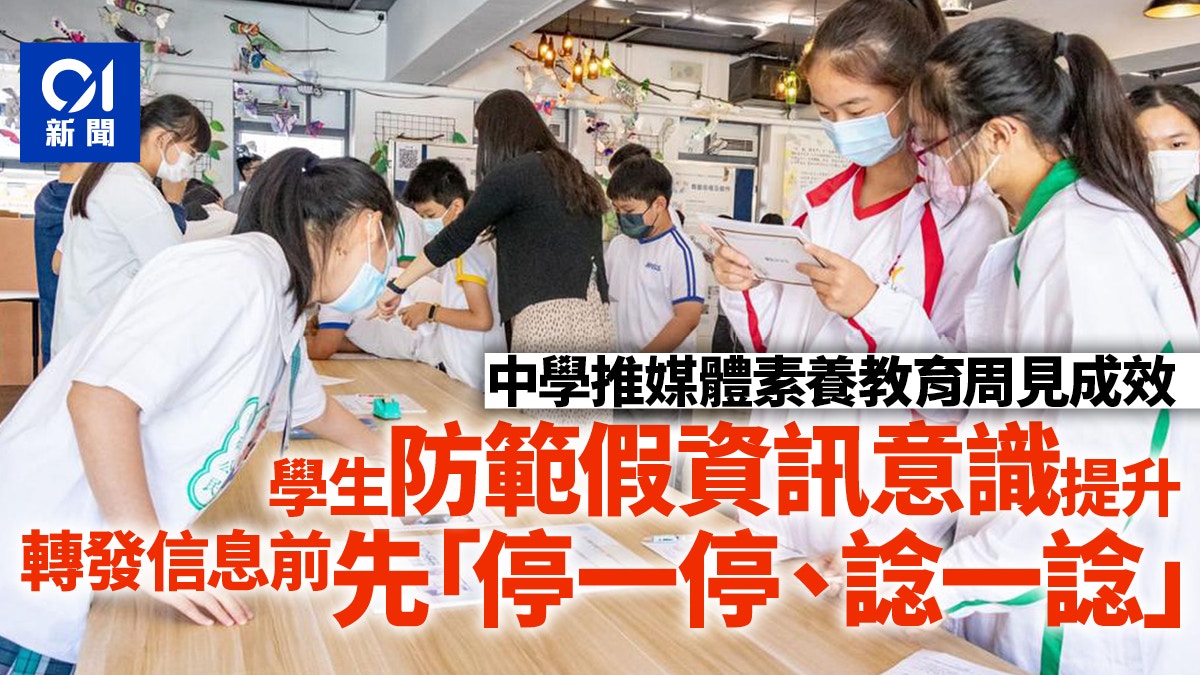Some secondary schools have implemented the "Media and Information Literacy Education Week" in their schools. Through a series of activities and lectures, they have successfully raised students' awareness of the authenticity of information.
In the future, the school will apply for a grant from the Quality Education Fund "My Pledge to Action - Enhanced Edition" to provide students with experiential activities to enhance their awareness and ability to distinguish between true and false information.
Kim Wai-ming, Principal of Hong Kong Sheng Kung Hui Bishop Ho Ming-wah Secondary School.
(Photo by Zhang Haowei)
Hong Kong Sheng Kung Hui Bishop Ho Ming Wah Secondary School Principal Kim Wai-ming said that at present, middle school students are exposed to a lot of online information in their daily lives, especially social media, short videos, etc., and some content is difficult to distinguish between true and false, and schools have been using different methods, such as in junior high schools Computer science, humanities, etc., improve students' media literacy through interdisciplinary application.
He pointed out that various rumors appeared in the society during the epidemic, so the school participated in the "UNESCO Global Media and Information Literacy Week" at the end of last year to cultivate students' awareness and ability to distinguish between true and false information.
Ms. Huang Xiaoshi, who is in charge of media and information literacy at the school, said that during the "Media and Information Literacy Education Week", he arranged a series of activities for students, including inter-class quiz competitions, games, inviting students to serve as media literacy ambassadors, and arranging outside groups to share with the school, etc. .
In addition, teachers are also arranged to receive training to equip teachers to meet their teaching needs.
She said that the results of the student questionnaire before the event showed that the students had weak awareness and did not understand the adverse effects of false information. However, after experiencing a series of activities and learning, they improved significantly, and they were able to grasp relevant concepts and make appropriate judgments.” Some students reported that after receiving messages during the epidemic, they would stop and think about them instead of forwarding them directly to their families.”
An exclusive interview with Hong Kong Sheng Kung Hui Bishop Ho Ming Wah Secondary School on Media Literacy, Principal Kim Wai Ming (left) and Mr. Huang Xiaoshi (right), who is in charge of the school's media and information literacy.
(Photo by Zhang Haowei)
Principal Jin believes that the biggest challenge for media information literacy education in the future lies in the rapid advancement of technology. Therefore, students must be trained to think carefully and discriminately and reduce the chance of them believing false information. It’s hard to tell the truth from the fake, and if you watch too much, you will believe it.” He said that the school has applied for the enhanced version of the Quality Education Fund “My Pledge to Action” and will arrange more activities for students in the future.
Mr. Huang added that media information literacy is a value-based development, which is different from general subject knowledge. Therefore, he intends to use the funding to arrange more experiential learning activities for students. The projects under consideration include arranging for students to visit local media organizations to learn about news and interviews, and inviting legal experts or veterans. Media professionals share relevant legal knowledge with students, and arrange students to participate in media practice activities.
+1
The "My Pledge to Action" Enhanced Grant is a subsidy provided by the Education Bureau to primary and secondary schools in response to the complex and ever-changing digital media environment, with a view to enabling students to learn to distinguish between true and false online information and other learning objectives.
The school can take this opportunity to organize media activities with credible media organizations: such as investigative reporting lectures/workshops given by senior journalists; true and false information verification workshops/anti-Internet fraud workshops organized by the data analysis team; online media teams Lectures/workshops on social media operations given by the lecturer; the above activities can be combined with visits by media organizations or held in schools to enrich students’ learning experience, strengthen training in media and information literacy, and understand the importance of information credibility, so as to teach students to be prudent and discerning.
If you have any inquiries about the above related services, you can contact our colleague Mr. Huang through the following methods:
Email: education@hk01.com (with the title “My Action Pledge Plus”)
WhatsApp or phone: 35828747
Contents of the Enhanced Media Literacy Course in Primary Schools Students Pay Attention to Online Etiquette and Respect Others Privacy Secondary Media Literacy Curriculum Content Develops Students to Become Law-abiding and Ethical Internet Users

